Introduction to Information Technology: HSBC Holdings Case Study
VerifiedAdded on 2023/06/12
|13
|4061
|334
Report
AI Summary
This report provides an overview of the role of information technology within HSBC Holdings, a service sector organization. It examines various application software used by the company, including Oracle Taleo Cloud Service, UKG Workforce Central Scheduler, Kyriba Treasury, Google Cloud Machine Learning Engine, and Salesforce CRM, detailing their functions and benefits. The report also addresses the importance of ethical and social issues, such as personal privacy, access rights, harmful actions, communication breakdown, and online scams, and their impact on business operations. Furthermore, it discusses the influence of information and communication technology (ICT) on enhancing business effectiveness, efficiency, and customer responsiveness within HSBC Holdings. The analysis concludes by highlighting the benefits and drawbacks of investing in IT and the role of IT in helping managers manage business.
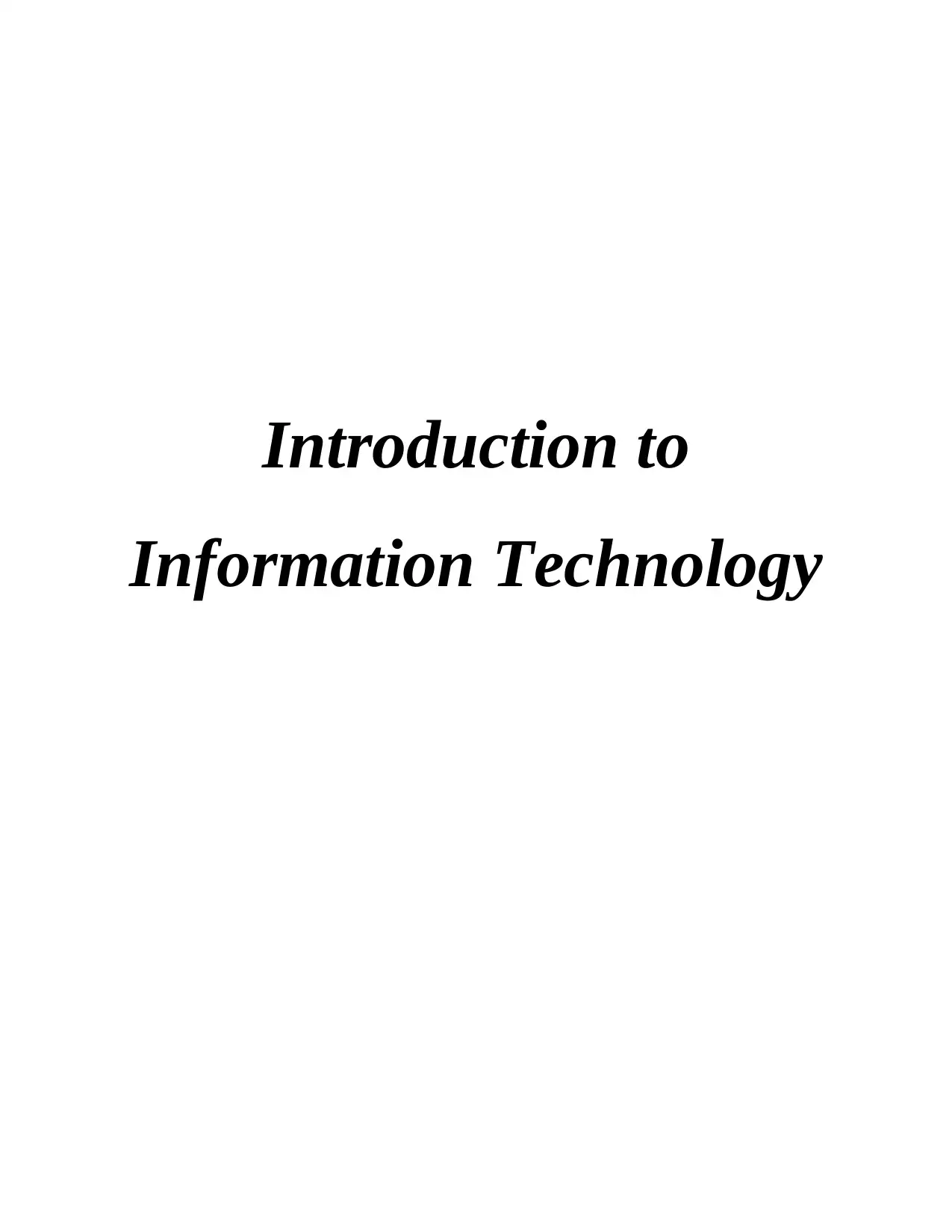
Introduction to
Information Technology
Information Technology
Paraphrase This Document
Need a fresh take? Get an instant paraphrase of this document with our AI Paraphraser
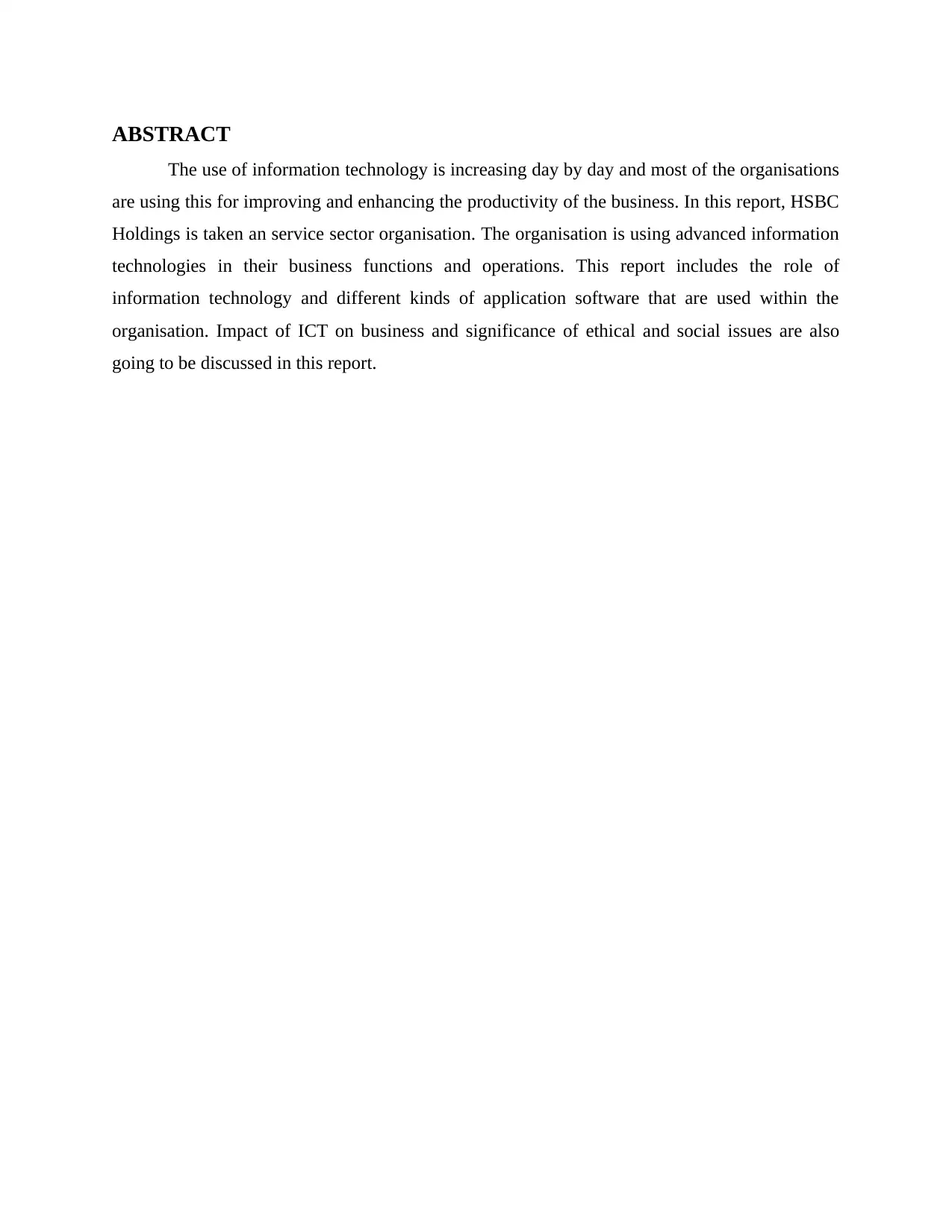
ABSTRACT
The use of information technology is increasing day by day and most of the organisations
are using this for improving and enhancing the productivity of the business. In this report, HSBC
Holdings is taken an service sector organisation. The organisation is using advanced information
technologies in their business functions and operations. This report includes the role of
information technology and different kinds of application software that are used within the
organisation. Impact of ICT on business and significance of ethical and social issues are also
going to be discussed in this report.
The use of information technology is increasing day by day and most of the organisations
are using this for improving and enhancing the productivity of the business. In this report, HSBC
Holdings is taken an service sector organisation. The organisation is using advanced information
technologies in their business functions and operations. This report includes the role of
information technology and different kinds of application software that are used within the
organisation. Impact of ICT on business and significance of ethical and social issues are also
going to be discussed in this report.
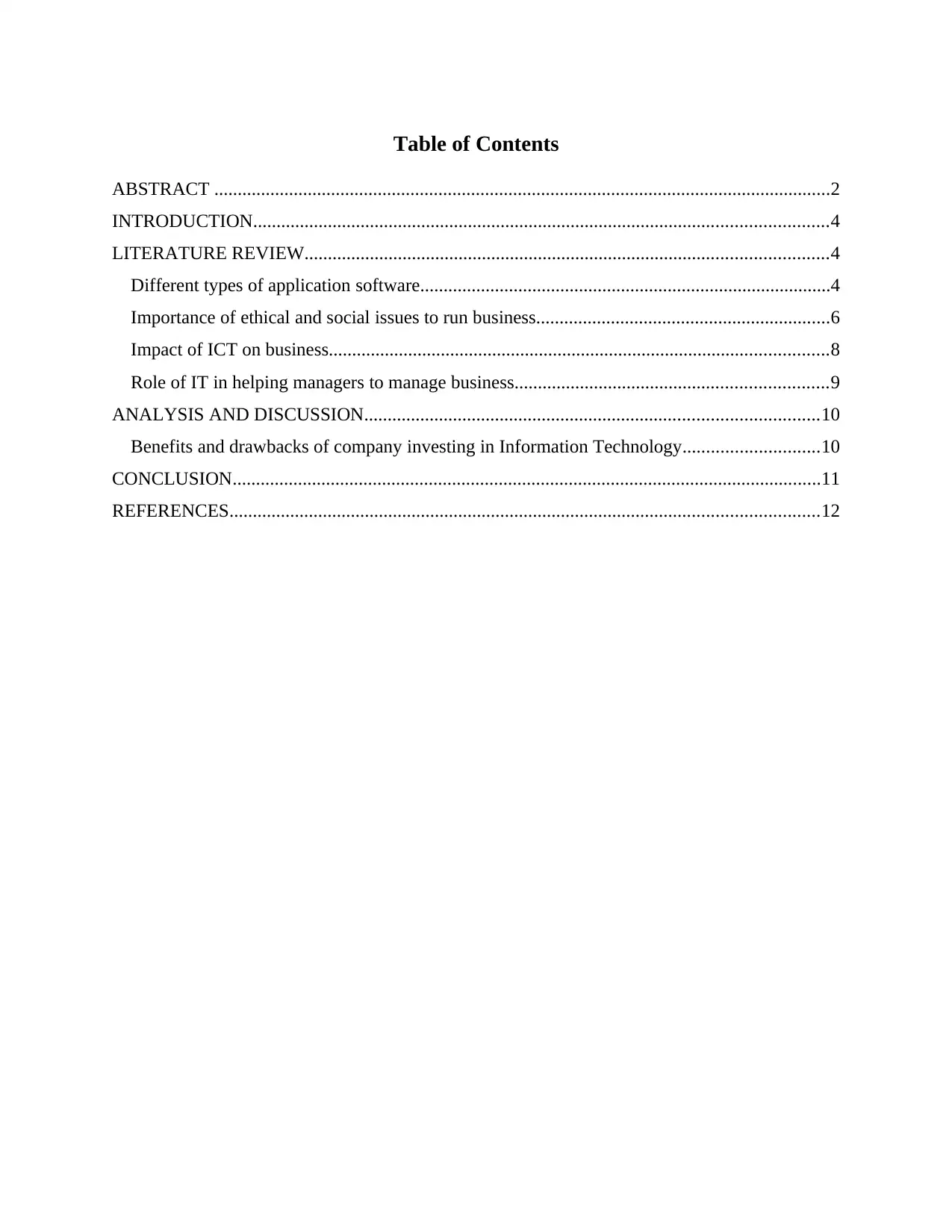
Table of Contents
ABSTRACT ....................................................................................................................................2
INTRODUCTION...........................................................................................................................4
LITERATURE REVIEW................................................................................................................4
Different types of application software........................................................................................4
Importance of ethical and social issues to run business...............................................................6
Impact of ICT on business...........................................................................................................8
Role of IT in helping managers to manage business...................................................................9
ANALYSIS AND DISCUSSION.................................................................................................10
Benefits and drawbacks of company investing in Information Technology.............................10
CONCLUSION..............................................................................................................................11
REFERENCES..............................................................................................................................12
ABSTRACT ....................................................................................................................................2
INTRODUCTION...........................................................................................................................4
LITERATURE REVIEW................................................................................................................4
Different types of application software........................................................................................4
Importance of ethical and social issues to run business...............................................................6
Impact of ICT on business...........................................................................................................8
Role of IT in helping managers to manage business...................................................................9
ANALYSIS AND DISCUSSION.................................................................................................10
Benefits and drawbacks of company investing in Information Technology.............................10
CONCLUSION..............................................................................................................................11
REFERENCES..............................................................................................................................12
⊘ This is a preview!⊘
Do you want full access?
Subscribe today to unlock all pages.

Trusted by 1+ million students worldwide
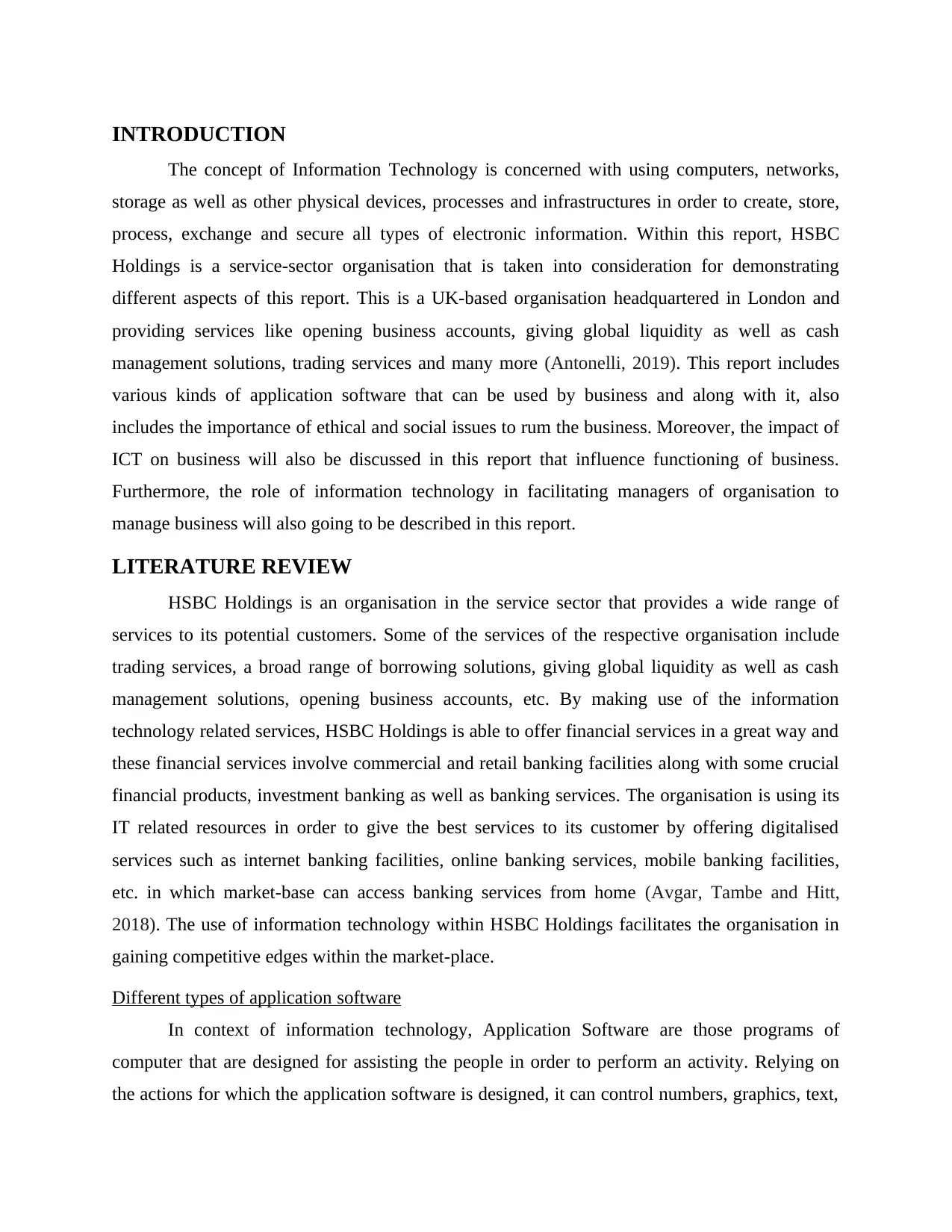
INTRODUCTION
The concept of Information Technology is concerned with using computers, networks,
storage as well as other physical devices, processes and infrastructures in order to create, store,
process, exchange and secure all types of electronic information. Within this report, HSBC
Holdings is a service-sector organisation that is taken into consideration for demonstrating
different aspects of this report. This is a UK-based organisation headquartered in London and
providing services like opening business accounts, giving global liquidity as well as cash
management solutions, trading services and many more (Antonelli, 2019). This report includes
various kinds of application software that can be used by business and along with it, also
includes the importance of ethical and social issues to rum the business. Moreover, the impact of
ICT on business will also be discussed in this report that influence functioning of business.
Furthermore, the role of information technology in facilitating managers of organisation to
manage business will also going to be described in this report.
LITERATURE REVIEW
HSBC Holdings is an organisation in the service sector that provides a wide range of
services to its potential customers. Some of the services of the respective organisation include
trading services, a broad range of borrowing solutions, giving global liquidity as well as cash
management solutions, opening business accounts, etc. By making use of the information
technology related services, HSBC Holdings is able to offer financial services in a great way and
these financial services involve commercial and retail banking facilities along with some crucial
financial products, investment banking as well as banking services. The organisation is using its
IT related resources in order to give the best services to its customer by offering digitalised
services such as internet banking facilities, online banking services, mobile banking facilities,
etc. in which market-base can access banking services from home (Avgar, Tambe and Hitt,
2018). The use of information technology within HSBC Holdings facilitates the organisation in
gaining competitive edges within the market-place.
Different types of application software
In context of information technology, Application Software are those programs of
computer that are designed for assisting the people in order to perform an activity. Relying on
the actions for which the application software is designed, it can control numbers, graphics, text,
The concept of Information Technology is concerned with using computers, networks,
storage as well as other physical devices, processes and infrastructures in order to create, store,
process, exchange and secure all types of electronic information. Within this report, HSBC
Holdings is a service-sector organisation that is taken into consideration for demonstrating
different aspects of this report. This is a UK-based organisation headquartered in London and
providing services like opening business accounts, giving global liquidity as well as cash
management solutions, trading services and many more (Antonelli, 2019). This report includes
various kinds of application software that can be used by business and along with it, also
includes the importance of ethical and social issues to rum the business. Moreover, the impact of
ICT on business will also be discussed in this report that influence functioning of business.
Furthermore, the role of information technology in facilitating managers of organisation to
manage business will also going to be described in this report.
LITERATURE REVIEW
HSBC Holdings is an organisation in the service sector that provides a wide range of
services to its potential customers. Some of the services of the respective organisation include
trading services, a broad range of borrowing solutions, giving global liquidity as well as cash
management solutions, opening business accounts, etc. By making use of the information
technology related services, HSBC Holdings is able to offer financial services in a great way and
these financial services involve commercial and retail banking facilities along with some crucial
financial products, investment banking as well as banking services. The organisation is using its
IT related resources in order to give the best services to its customer by offering digitalised
services such as internet banking facilities, online banking services, mobile banking facilities,
etc. in which market-base can access banking services from home (Avgar, Tambe and Hitt,
2018). The use of information technology within HSBC Holdings facilitates the organisation in
gaining competitive edges within the market-place.
Different types of application software
In context of information technology, Application Software are those programs of
computer that are designed for assisting the people in order to perform an activity. Relying on
the actions for which the application software is designed, it can control numbers, graphics, text,
Paraphrase This Document
Need a fresh take? Get an instant paraphrase of this document with our AI Paraphraser
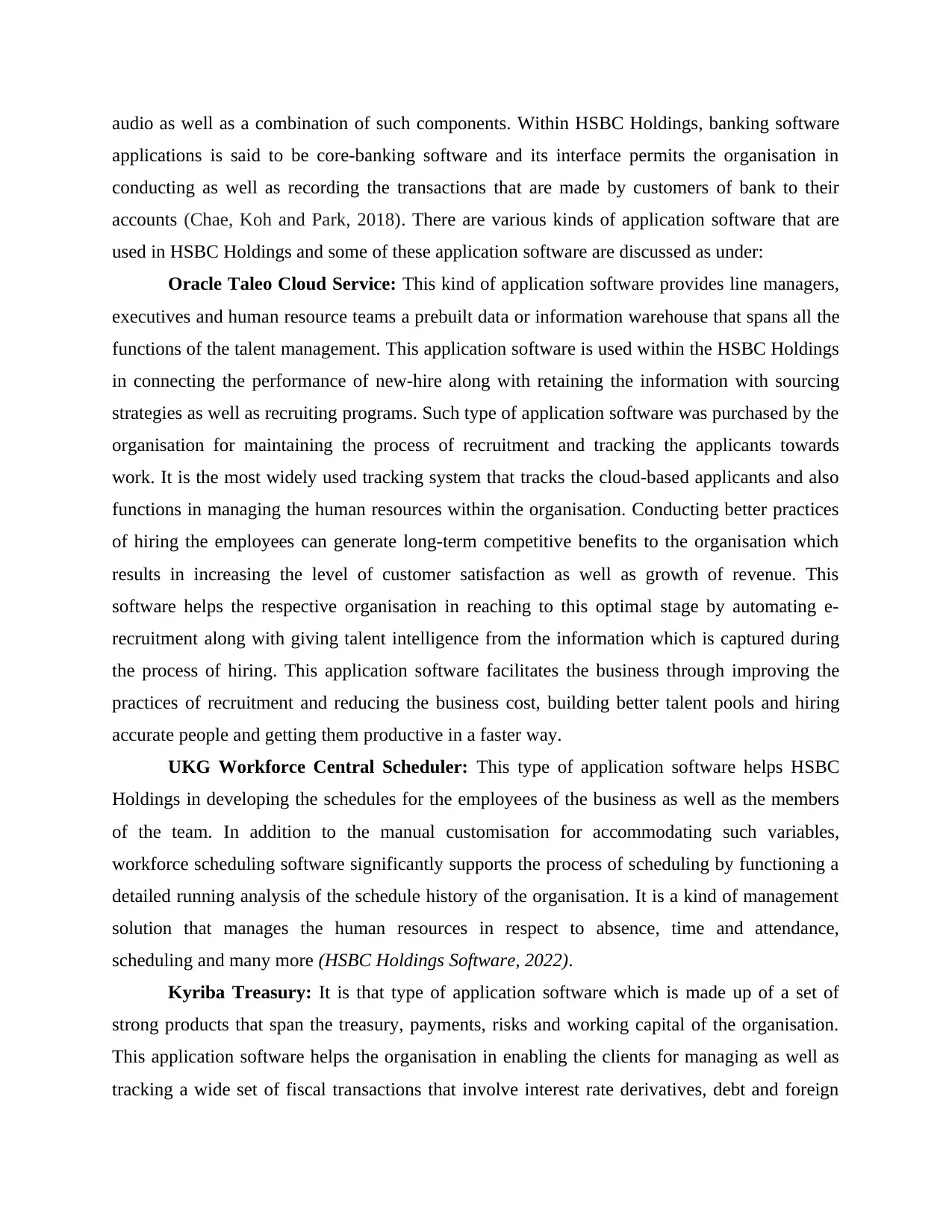
audio as well as a combination of such components. Within HSBC Holdings, banking software
applications is said to be core-banking software and its interface permits the organisation in
conducting as well as recording the transactions that are made by customers of bank to their
accounts (Chae, Koh and Park, 2018). There are various kinds of application software that are
used in HSBC Holdings and some of these application software are discussed as under:
Oracle Taleo Cloud Service: This kind of application software provides line managers,
executives and human resource teams a prebuilt data or information warehouse that spans all the
functions of the talent management. This application software is used within the HSBC Holdings
in connecting the performance of new-hire along with retaining the information with sourcing
strategies as well as recruiting programs. Such type of application software was purchased by the
organisation for maintaining the process of recruitment and tracking the applicants towards
work. It is the most widely used tracking system that tracks the cloud-based applicants and also
functions in managing the human resources within the organisation. Conducting better practices
of hiring the employees can generate long-term competitive benefits to the organisation which
results in increasing the level of customer satisfaction as well as growth of revenue. This
software helps the respective organisation in reaching to this optimal stage by automating e-
recruitment along with giving talent intelligence from the information which is captured during
the process of hiring. This application software facilitates the business through improving the
practices of recruitment and reducing the business cost, building better talent pools and hiring
accurate people and getting them productive in a faster way.
UKG Workforce Central Scheduler: This type of application software helps HSBC
Holdings in developing the schedules for the employees of the business as well as the members
of the team. In addition to the manual customisation for accommodating such variables,
workforce scheduling software significantly supports the process of scheduling by functioning a
detailed running analysis of the schedule history of the organisation. It is a kind of management
solution that manages the human resources in respect to absence, time and attendance,
scheduling and many more (HSBC Holdings Software, 2022).
Kyriba Treasury: It is that type of application software which is made up of a set of
strong products that span the treasury, payments, risks and working capital of the organisation.
This application software helps the organisation in enabling the clients for managing as well as
tracking a wide set of fiscal transactions that involve interest rate derivatives, debt and foreign
applications is said to be core-banking software and its interface permits the organisation in
conducting as well as recording the transactions that are made by customers of bank to their
accounts (Chae, Koh and Park, 2018). There are various kinds of application software that are
used in HSBC Holdings and some of these application software are discussed as under:
Oracle Taleo Cloud Service: This kind of application software provides line managers,
executives and human resource teams a prebuilt data or information warehouse that spans all the
functions of the talent management. This application software is used within the HSBC Holdings
in connecting the performance of new-hire along with retaining the information with sourcing
strategies as well as recruiting programs. Such type of application software was purchased by the
organisation for maintaining the process of recruitment and tracking the applicants towards
work. It is the most widely used tracking system that tracks the cloud-based applicants and also
functions in managing the human resources within the organisation. Conducting better practices
of hiring the employees can generate long-term competitive benefits to the organisation which
results in increasing the level of customer satisfaction as well as growth of revenue. This
software helps the respective organisation in reaching to this optimal stage by automating e-
recruitment along with giving talent intelligence from the information which is captured during
the process of hiring. This application software facilitates the business through improving the
practices of recruitment and reducing the business cost, building better talent pools and hiring
accurate people and getting them productive in a faster way.
UKG Workforce Central Scheduler: This type of application software helps HSBC
Holdings in developing the schedules for the employees of the business as well as the members
of the team. In addition to the manual customisation for accommodating such variables,
workforce scheduling software significantly supports the process of scheduling by functioning a
detailed running analysis of the schedule history of the organisation. It is a kind of management
solution that manages the human resources in respect to absence, time and attendance,
scheduling and many more (HSBC Holdings Software, 2022).
Kyriba Treasury: It is that type of application software which is made up of a set of
strong products that span the treasury, payments, risks and working capital of the organisation.
This application software helps the organisation in enabling the clients for managing as well as
tracking a wide set of fiscal transactions that involve interest rate derivatives, debt and foreign
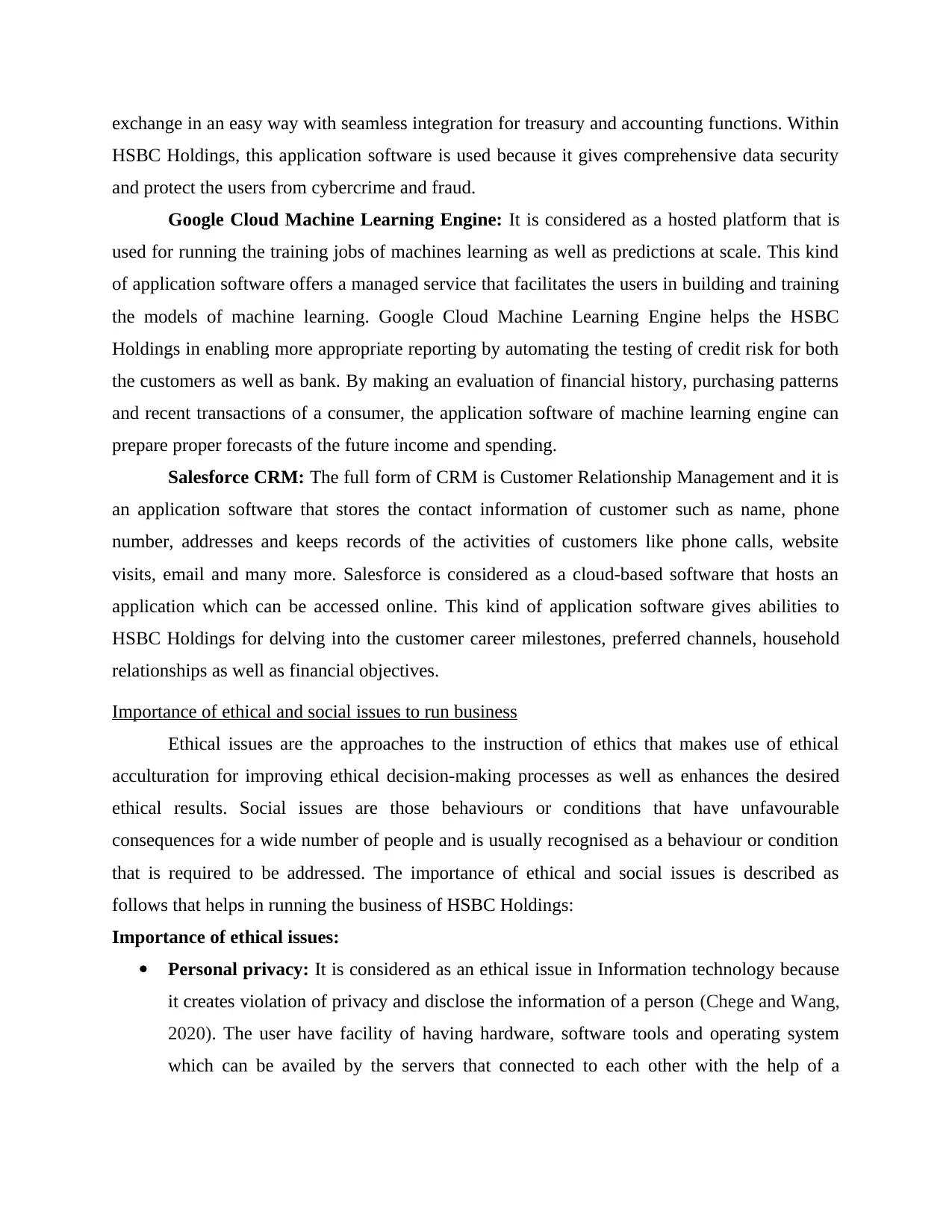
exchange in an easy way with seamless integration for treasury and accounting functions. Within
HSBC Holdings, this application software is used because it gives comprehensive data security
and protect the users from cybercrime and fraud.
Google Cloud Machine Learning Engine: It is considered as a hosted platform that is
used for running the training jobs of machines learning as well as predictions at scale. This kind
of application software offers a managed service that facilitates the users in building and training
the models of machine learning. Google Cloud Machine Learning Engine helps the HSBC
Holdings in enabling more appropriate reporting by automating the testing of credit risk for both
the customers as well as bank. By making an evaluation of financial history, purchasing patterns
and recent transactions of a consumer, the application software of machine learning engine can
prepare proper forecasts of the future income and spending.
Salesforce CRM: The full form of CRM is Customer Relationship Management and it is
an application software that stores the contact information of customer such as name, phone
number, addresses and keeps records of the activities of customers like phone calls, website
visits, email and many more. Salesforce is considered as a cloud-based software that hosts an
application which can be accessed online. This kind of application software gives abilities to
HSBC Holdings for delving into the customer career milestones, preferred channels, household
relationships as well as financial objectives.
Importance of ethical and social issues to run business
Ethical issues are the approaches to the instruction of ethics that makes use of ethical
acculturation for improving ethical decision-making processes as well as enhances the desired
ethical results. Social issues are those behaviours or conditions that have unfavourable
consequences for a wide number of people and is usually recognised as a behaviour or condition
that is required to be addressed. The importance of ethical and social issues is described as
follows that helps in running the business of HSBC Holdings:
Importance of ethical issues:
Personal privacy: It is considered as an ethical issue in Information technology because
it creates violation of privacy and disclose the information of a person (Chege and Wang,
2020). The user have facility of having hardware, software tools and operating system
which can be availed by the servers that connected to each other with the help of a
HSBC Holdings, this application software is used because it gives comprehensive data security
and protect the users from cybercrime and fraud.
Google Cloud Machine Learning Engine: It is considered as a hosted platform that is
used for running the training jobs of machines learning as well as predictions at scale. This kind
of application software offers a managed service that facilitates the users in building and training
the models of machine learning. Google Cloud Machine Learning Engine helps the HSBC
Holdings in enabling more appropriate reporting by automating the testing of credit risk for both
the customers as well as bank. By making an evaluation of financial history, purchasing patterns
and recent transactions of a consumer, the application software of machine learning engine can
prepare proper forecasts of the future income and spending.
Salesforce CRM: The full form of CRM is Customer Relationship Management and it is
an application software that stores the contact information of customer such as name, phone
number, addresses and keeps records of the activities of customers like phone calls, website
visits, email and many more. Salesforce is considered as a cloud-based software that hosts an
application which can be accessed online. This kind of application software gives abilities to
HSBC Holdings for delving into the customer career milestones, preferred channels, household
relationships as well as financial objectives.
Importance of ethical and social issues to run business
Ethical issues are the approaches to the instruction of ethics that makes use of ethical
acculturation for improving ethical decision-making processes as well as enhances the desired
ethical results. Social issues are those behaviours or conditions that have unfavourable
consequences for a wide number of people and is usually recognised as a behaviour or condition
that is required to be addressed. The importance of ethical and social issues is described as
follows that helps in running the business of HSBC Holdings:
Importance of ethical issues:
Personal privacy: It is considered as an ethical issue in Information technology because
it creates violation of privacy and disclose the information of a person (Chege and Wang,
2020). The user have facility of having hardware, software tools and operating system
which can be availed by the servers that connected to each other with the help of a
⊘ This is a preview!⊘
Do you want full access?
Subscribe today to unlock all pages.

Trusted by 1+ million students worldwide
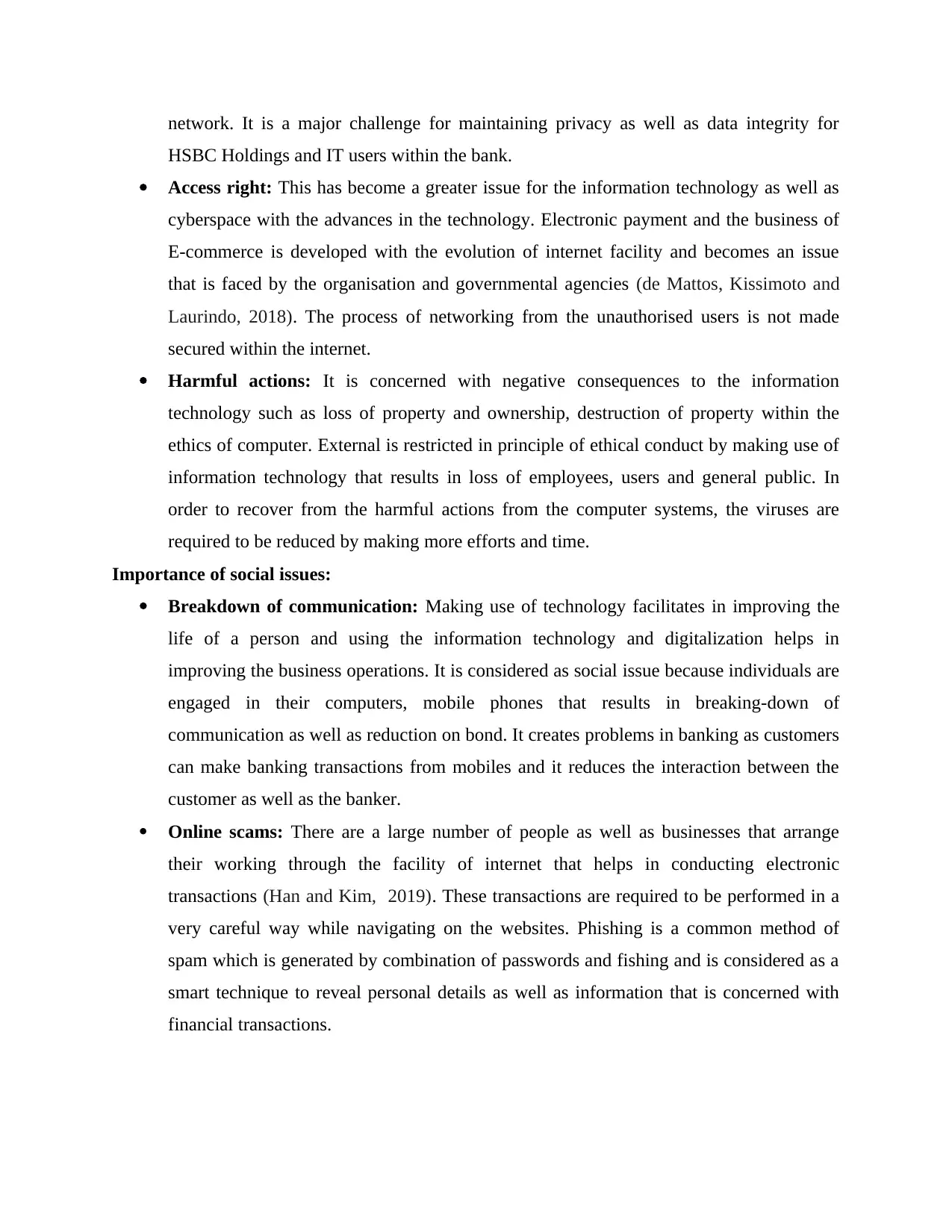
network. It is a major challenge for maintaining privacy as well as data integrity for
HSBC Holdings and IT users within the bank.
Access right: This has become a greater issue for the information technology as well as
cyberspace with the advances in the technology. Electronic payment and the business of
E-commerce is developed with the evolution of internet facility and becomes an issue
that is faced by the organisation and governmental agencies (de Mattos, Kissimoto and
Laurindo, 2018). The process of networking from the unauthorised users is not made
secured within the internet.
Harmful actions: It is concerned with negative consequences to the information
technology such as loss of property and ownership, destruction of property within the
ethics of computer. External is restricted in principle of ethical conduct by making use of
information technology that results in loss of employees, users and general public. In
order to recover from the harmful actions from the computer systems, the viruses are
required to be reduced by making more efforts and time.
Importance of social issues:
Breakdown of communication: Making use of technology facilitates in improving the
life of a person and using the information technology and digitalization helps in
improving the business operations. It is considered as social issue because individuals are
engaged in their computers, mobile phones that results in breaking-down of
communication as well as reduction on bond. It creates problems in banking as customers
can make banking transactions from mobiles and it reduces the interaction between the
customer as well as the banker.
Online scams: There are a large number of people as well as businesses that arrange
their working through the facility of internet that helps in conducting electronic
transactions (Han and Kim, 2019). These transactions are required to be performed in a
very careful way while navigating on the websites. Phishing is a common method of
spam which is generated by combination of passwords and fishing and is considered as a
smart technique to reveal personal details as well as information that is concerned with
financial transactions.
HSBC Holdings and IT users within the bank.
Access right: This has become a greater issue for the information technology as well as
cyberspace with the advances in the technology. Electronic payment and the business of
E-commerce is developed with the evolution of internet facility and becomes an issue
that is faced by the organisation and governmental agencies (de Mattos, Kissimoto and
Laurindo, 2018). The process of networking from the unauthorised users is not made
secured within the internet.
Harmful actions: It is concerned with negative consequences to the information
technology such as loss of property and ownership, destruction of property within the
ethics of computer. External is restricted in principle of ethical conduct by making use of
information technology that results in loss of employees, users and general public. In
order to recover from the harmful actions from the computer systems, the viruses are
required to be reduced by making more efforts and time.
Importance of social issues:
Breakdown of communication: Making use of technology facilitates in improving the
life of a person and using the information technology and digitalization helps in
improving the business operations. It is considered as social issue because individuals are
engaged in their computers, mobile phones that results in breaking-down of
communication as well as reduction on bond. It creates problems in banking as customers
can make banking transactions from mobiles and it reduces the interaction between the
customer as well as the banker.
Online scams: There are a large number of people as well as businesses that arrange
their working through the facility of internet that helps in conducting electronic
transactions (Han and Kim, 2019). These transactions are required to be performed in a
very careful way while navigating on the websites. Phishing is a common method of
spam which is generated by combination of passwords and fishing and is considered as a
smart technique to reveal personal details as well as information that is concerned with
financial transactions.
Paraphrase This Document
Need a fresh take? Get an instant paraphrase of this document with our AI Paraphraser
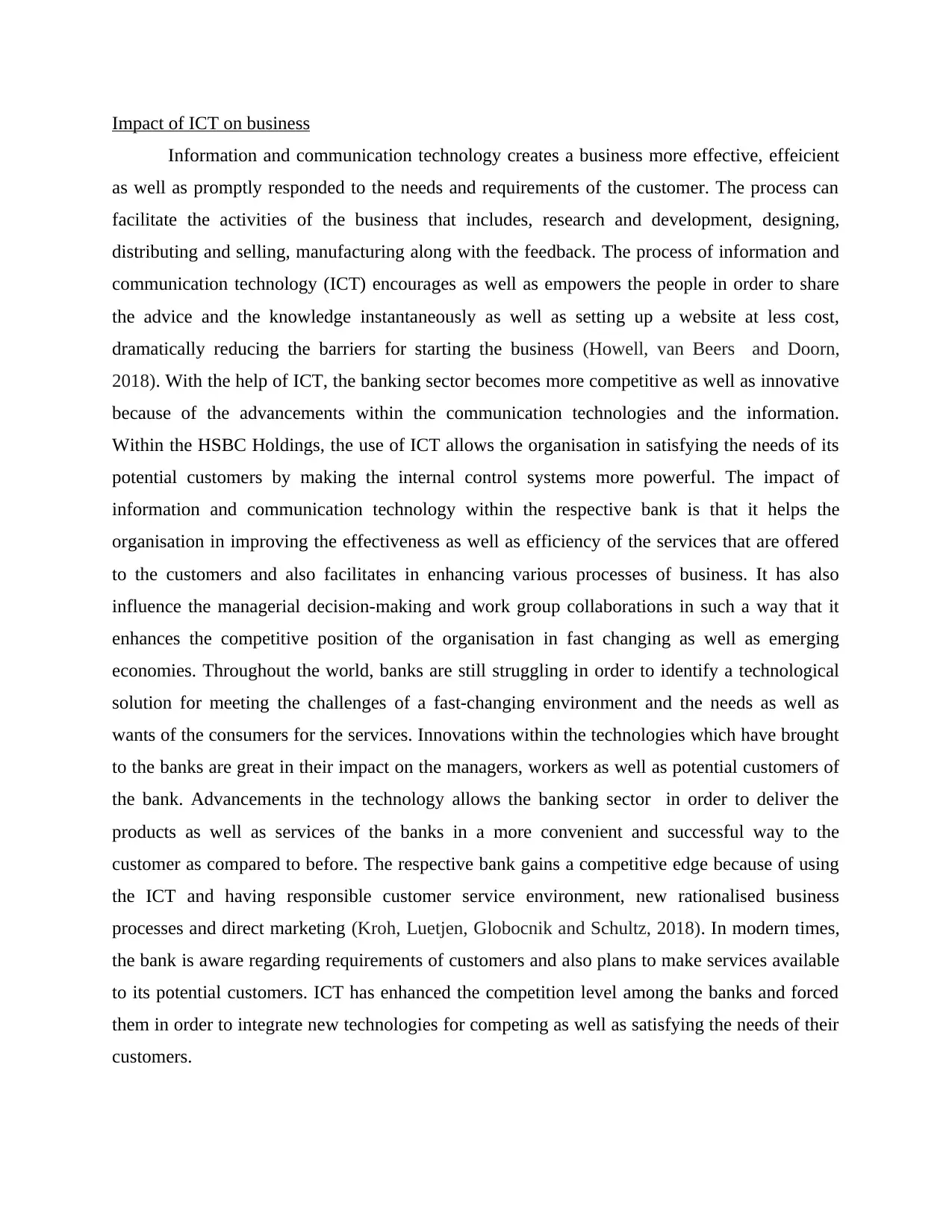
Impact of ICT on business
Information and communication technology creates a business more effective, effeicient
as well as promptly responded to the needs and requirements of the customer. The process can
facilitate the activities of the business that includes, research and development, designing,
distributing and selling, manufacturing along with the feedback. The process of information and
communication technology (ICT) encourages as well as empowers the people in order to share
the advice and the knowledge instantaneously as well as setting up a website at less cost,
dramatically reducing the barriers for starting the business (Howell, van Beers and Doorn,
2018). With the help of ICT, the banking sector becomes more competitive as well as innovative
because of the advancements within the communication technologies and the information.
Within the HSBC Holdings, the use of ICT allows the organisation in satisfying the needs of its
potential customers by making the internal control systems more powerful. The impact of
information and communication technology within the respective bank is that it helps the
organisation in improving the effectiveness as well as efficiency of the services that are offered
to the customers and also facilitates in enhancing various processes of business. It has also
influence the managerial decision-making and work group collaborations in such a way that it
enhances the competitive position of the organisation in fast changing as well as emerging
economies. Throughout the world, banks are still struggling in order to identify a technological
solution for meeting the challenges of a fast-changing environment and the needs as well as
wants of the consumers for the services. Innovations within the technologies which have brought
to the banks are great in their impact on the managers, workers as well as potential customers of
the bank. Advancements in the technology allows the banking sector in order to deliver the
products as well as services of the banks in a more convenient and successful way to the
customer as compared to before. The respective bank gains a competitive edge because of using
the ICT and having responsible customer service environment, new rationalised business
processes and direct marketing (Kroh, Luetjen, Globocnik and Schultz, 2018). In modern times,
the bank is aware regarding requirements of customers and also plans to make services available
to its potential customers. ICT has enhanced the competition level among the banks and forced
them in order to integrate new technologies for competing as well as satisfying the needs of their
customers.
Information and communication technology creates a business more effective, effeicient
as well as promptly responded to the needs and requirements of the customer. The process can
facilitate the activities of the business that includes, research and development, designing,
distributing and selling, manufacturing along with the feedback. The process of information and
communication technology (ICT) encourages as well as empowers the people in order to share
the advice and the knowledge instantaneously as well as setting up a website at less cost,
dramatically reducing the barriers for starting the business (Howell, van Beers and Doorn,
2018). With the help of ICT, the banking sector becomes more competitive as well as innovative
because of the advancements within the communication technologies and the information.
Within the HSBC Holdings, the use of ICT allows the organisation in satisfying the needs of its
potential customers by making the internal control systems more powerful. The impact of
information and communication technology within the respective bank is that it helps the
organisation in improving the effectiveness as well as efficiency of the services that are offered
to the customers and also facilitates in enhancing various processes of business. It has also
influence the managerial decision-making and work group collaborations in such a way that it
enhances the competitive position of the organisation in fast changing as well as emerging
economies. Throughout the world, banks are still struggling in order to identify a technological
solution for meeting the challenges of a fast-changing environment and the needs as well as
wants of the consumers for the services. Innovations within the technologies which have brought
to the banks are great in their impact on the managers, workers as well as potential customers of
the bank. Advancements in the technology allows the banking sector in order to deliver the
products as well as services of the banks in a more convenient and successful way to the
customer as compared to before. The respective bank gains a competitive edge because of using
the ICT and having responsible customer service environment, new rationalised business
processes and direct marketing (Kroh, Luetjen, Globocnik and Schultz, 2018). In modern times,
the bank is aware regarding requirements of customers and also plans to make services available
to its potential customers. ICT has enhanced the competition level among the banks and forced
them in order to integrate new technologies for competing as well as satisfying the needs of their
customers.
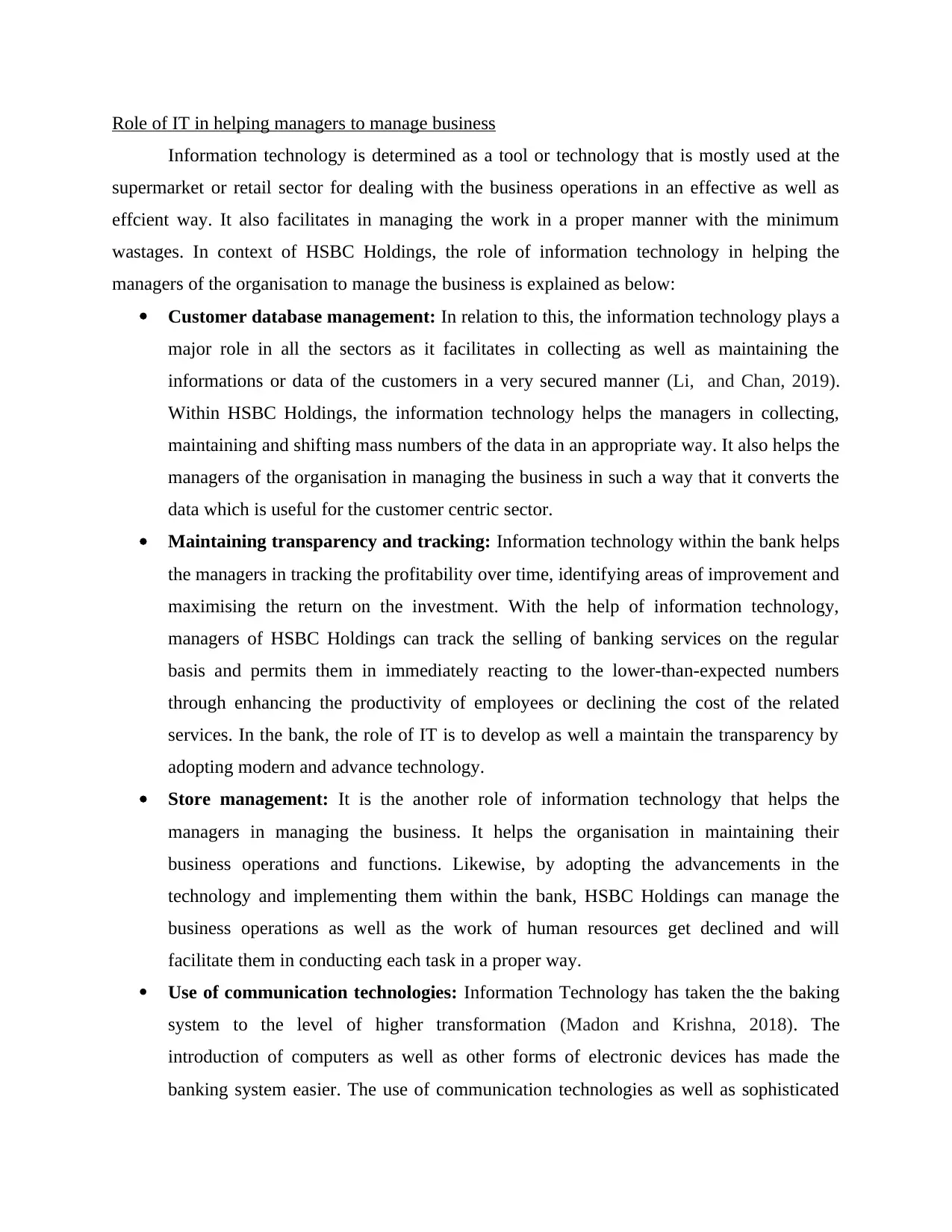
Role of IT in helping managers to manage business
Information technology is determined as a tool or technology that is mostly used at the
supermarket or retail sector for dealing with the business operations in an effective as well as
effcient way. It also facilitates in managing the work in a proper manner with the minimum
wastages. In context of HSBC Holdings, the role of information technology in helping the
managers of the organisation to manage the business is explained as below:
Customer database management: In relation to this, the information technology plays a
major role in all the sectors as it facilitates in collecting as well as maintaining the
informations or data of the customers in a very secured manner (Li, and Chan, 2019).
Within HSBC Holdings, the information technology helps the managers in collecting,
maintaining and shifting mass numbers of the data in an appropriate way. It also helps the
managers of the organisation in managing the business in such a way that it converts the
data which is useful for the customer centric sector.
Maintaining transparency and tracking: Information technology within the bank helps
the managers in tracking the profitability over time, identifying areas of improvement and
maximising the return on the investment. With the help of information technology,
managers of HSBC Holdings can track the selling of banking services on the regular
basis and permits them in immediately reacting to the lower-than-expected numbers
through enhancing the productivity of employees or declining the cost of the related
services. In the bank, the role of IT is to develop as well a maintain the transparency by
adopting modern and advance technology.
Store management: It is the another role of information technology that helps the
managers in managing the business. It helps the organisation in maintaining their
business operations and functions. Likewise, by adopting the advancements in the
technology and implementing them within the bank, HSBC Holdings can manage the
business operations as well as the work of human resources get declined and will
facilitate them in conducting each task in a proper way.
Use of communication technologies: Information Technology has taken the the baking
system to the level of higher transformation (Madon and Krishna, 2018). The
introduction of computers as well as other forms of electronic devices has made the
banking system easier. The use of communication technologies as well as sophisticated
Information technology is determined as a tool or technology that is mostly used at the
supermarket or retail sector for dealing with the business operations in an effective as well as
effcient way. It also facilitates in managing the work in a proper manner with the minimum
wastages. In context of HSBC Holdings, the role of information technology in helping the
managers of the organisation to manage the business is explained as below:
Customer database management: In relation to this, the information technology plays a
major role in all the sectors as it facilitates in collecting as well as maintaining the
informations or data of the customers in a very secured manner (Li, and Chan, 2019).
Within HSBC Holdings, the information technology helps the managers in collecting,
maintaining and shifting mass numbers of the data in an appropriate way. It also helps the
managers of the organisation in managing the business in such a way that it converts the
data which is useful for the customer centric sector.
Maintaining transparency and tracking: Information technology within the bank helps
the managers in tracking the profitability over time, identifying areas of improvement and
maximising the return on the investment. With the help of information technology,
managers of HSBC Holdings can track the selling of banking services on the regular
basis and permits them in immediately reacting to the lower-than-expected numbers
through enhancing the productivity of employees or declining the cost of the related
services. In the bank, the role of IT is to develop as well a maintain the transparency by
adopting modern and advance technology.
Store management: It is the another role of information technology that helps the
managers in managing the business. It helps the organisation in maintaining their
business operations and functions. Likewise, by adopting the advancements in the
technology and implementing them within the bank, HSBC Holdings can manage the
business operations as well as the work of human resources get declined and will
facilitate them in conducting each task in a proper way.
Use of communication technologies: Information Technology has taken the the baking
system to the level of higher transformation (Madon and Krishna, 2018). The
introduction of computers as well as other forms of electronic devices has made the
banking system easier. The use of communication technologies as well as sophisticated
⊘ This is a preview!⊘
Do you want full access?
Subscribe today to unlock all pages.

Trusted by 1+ million students worldwide
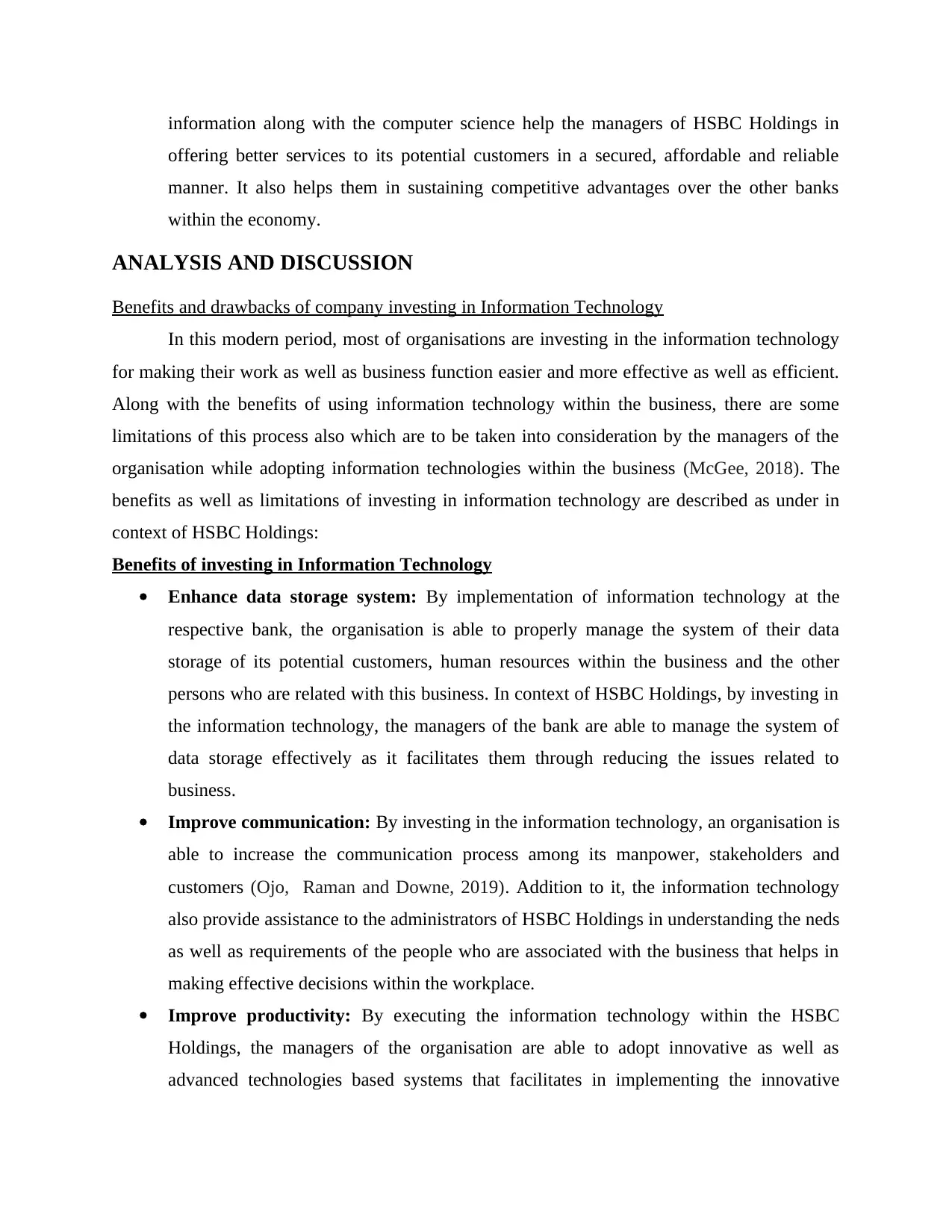
information along with the computer science help the managers of HSBC Holdings in
offering better services to its potential customers in a secured, affordable and reliable
manner. It also helps them in sustaining competitive advantages over the other banks
within the economy.
ANALYSIS AND DISCUSSION
Benefits and drawbacks of company investing in Information Technology
In this modern period, most of organisations are investing in the information technology
for making their work as well as business function easier and more effective as well as efficient.
Along with the benefits of using information technology within the business, there are some
limitations of this process also which are to be taken into consideration by the managers of the
organisation while adopting information technologies within the business (McGee, 2018). The
benefits as well as limitations of investing in information technology are described as under in
context of HSBC Holdings:
Benefits of investing in Information Technology
Enhance data storage system: By implementation of information technology at the
respective bank, the organisation is able to properly manage the system of their data
storage of its potential customers, human resources within the business and the other
persons who are related with this business. In context of HSBC Holdings, by investing in
the information technology, the managers of the bank are able to manage the system of
data storage effectively as it facilitates them through reducing the issues related to
business.
Improve communication: By investing in the information technology, an organisation is
able to increase the communication process among its manpower, stakeholders and
customers (Ojo, Raman and Downe, 2019). Addition to it, the information technology
also provide assistance to the administrators of HSBC Holdings in understanding the neds
as well as requirements of the people who are associated with the business that helps in
making effective decisions within the workplace.
Improve productivity: By executing the information technology within the HSBC
Holdings, the managers of the organisation are able to adopt innovative as well as
advanced technologies based systems that facilitates in implementing the innovative
offering better services to its potential customers in a secured, affordable and reliable
manner. It also helps them in sustaining competitive advantages over the other banks
within the economy.
ANALYSIS AND DISCUSSION
Benefits and drawbacks of company investing in Information Technology
In this modern period, most of organisations are investing in the information technology
for making their work as well as business function easier and more effective as well as efficient.
Along with the benefits of using information technology within the business, there are some
limitations of this process also which are to be taken into consideration by the managers of the
organisation while adopting information technologies within the business (McGee, 2018). The
benefits as well as limitations of investing in information technology are described as under in
context of HSBC Holdings:
Benefits of investing in Information Technology
Enhance data storage system: By implementation of information technology at the
respective bank, the organisation is able to properly manage the system of their data
storage of its potential customers, human resources within the business and the other
persons who are related with this business. In context of HSBC Holdings, by investing in
the information technology, the managers of the bank are able to manage the system of
data storage effectively as it facilitates them through reducing the issues related to
business.
Improve communication: By investing in the information technology, an organisation is
able to increase the communication process among its manpower, stakeholders and
customers (Ojo, Raman and Downe, 2019). Addition to it, the information technology
also provide assistance to the administrators of HSBC Holdings in understanding the neds
as well as requirements of the people who are associated with the business that helps in
making effective decisions within the workplace.
Improve productivity: By executing the information technology within the HSBC
Holdings, the managers of the organisation are able to adopt innovative as well as
advanced technologies based systems that facilitates in implementing the innovative
Paraphrase This Document
Need a fresh take? Get an instant paraphrase of this document with our AI Paraphraser
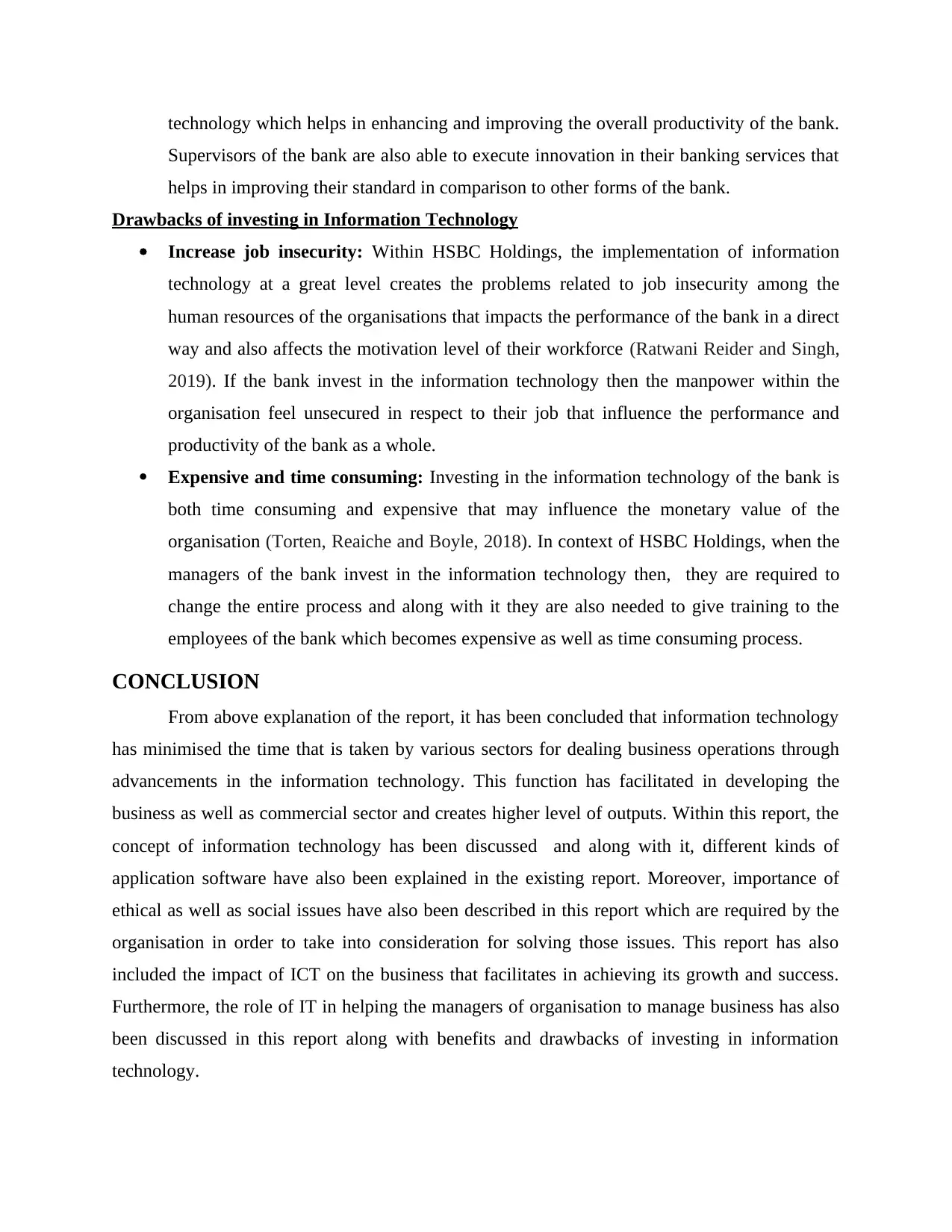
technology which helps in enhancing and improving the overall productivity of the bank.
Supervisors of the bank are also able to execute innovation in their banking services that
helps in improving their standard in comparison to other forms of the bank.
Drawbacks of investing in Information Technology
Increase job insecurity: Within HSBC Holdings, the implementation of information
technology at a great level creates the problems related to job insecurity among the
human resources of the organisations that impacts the performance of the bank in a direct
way and also affects the motivation level of their workforce (Ratwani Reider and Singh,
2019). If the bank invest in the information technology then the manpower within the
organisation feel unsecured in respect to their job that influence the performance and
productivity of the bank as a whole.
Expensive and time consuming: Investing in the information technology of the bank is
both time consuming and expensive that may influence the monetary value of the
organisation (Torten, Reaiche and Boyle, 2018). In context of HSBC Holdings, when the
managers of the bank invest in the information technology then, they are required to
change the entire process and along with it they are also needed to give training to the
employees of the bank which becomes expensive as well as time consuming process.
CONCLUSION
From above explanation of the report, it has been concluded that information technology
has minimised the time that is taken by various sectors for dealing business operations through
advancements in the information technology. This function has facilitated in developing the
business as well as commercial sector and creates higher level of outputs. Within this report, the
concept of information technology has been discussed and along with it, different kinds of
application software have also been explained in the existing report. Moreover, importance of
ethical as well as social issues have also been described in this report which are required by the
organisation in order to take into consideration for solving those issues. This report has also
included the impact of ICT on the business that facilitates in achieving its growth and success.
Furthermore, the role of IT in helping the managers of organisation to manage business has also
been discussed in this report along with benefits and drawbacks of investing in information
technology.
Supervisors of the bank are also able to execute innovation in their banking services that
helps in improving their standard in comparison to other forms of the bank.
Drawbacks of investing in Information Technology
Increase job insecurity: Within HSBC Holdings, the implementation of information
technology at a great level creates the problems related to job insecurity among the
human resources of the organisations that impacts the performance of the bank in a direct
way and also affects the motivation level of their workforce (Ratwani Reider and Singh,
2019). If the bank invest in the information technology then the manpower within the
organisation feel unsecured in respect to their job that influence the performance and
productivity of the bank as a whole.
Expensive and time consuming: Investing in the information technology of the bank is
both time consuming and expensive that may influence the monetary value of the
organisation (Torten, Reaiche and Boyle, 2018). In context of HSBC Holdings, when the
managers of the bank invest in the information technology then, they are required to
change the entire process and along with it they are also needed to give training to the
employees of the bank which becomes expensive as well as time consuming process.
CONCLUSION
From above explanation of the report, it has been concluded that information technology
has minimised the time that is taken by various sectors for dealing business operations through
advancements in the information technology. This function has facilitated in developing the
business as well as commercial sector and creates higher level of outputs. Within this report, the
concept of information technology has been discussed and along with it, different kinds of
application software have also been explained in the existing report. Moreover, importance of
ethical as well as social issues have also been described in this report which are required by the
organisation in order to take into consideration for solving those issues. This report has also
included the impact of ICT on the business that facilitates in achieving its growth and success.
Furthermore, the role of IT in helping the managers of organisation to manage business has also
been discussed in this report along with benefits and drawbacks of investing in information
technology.
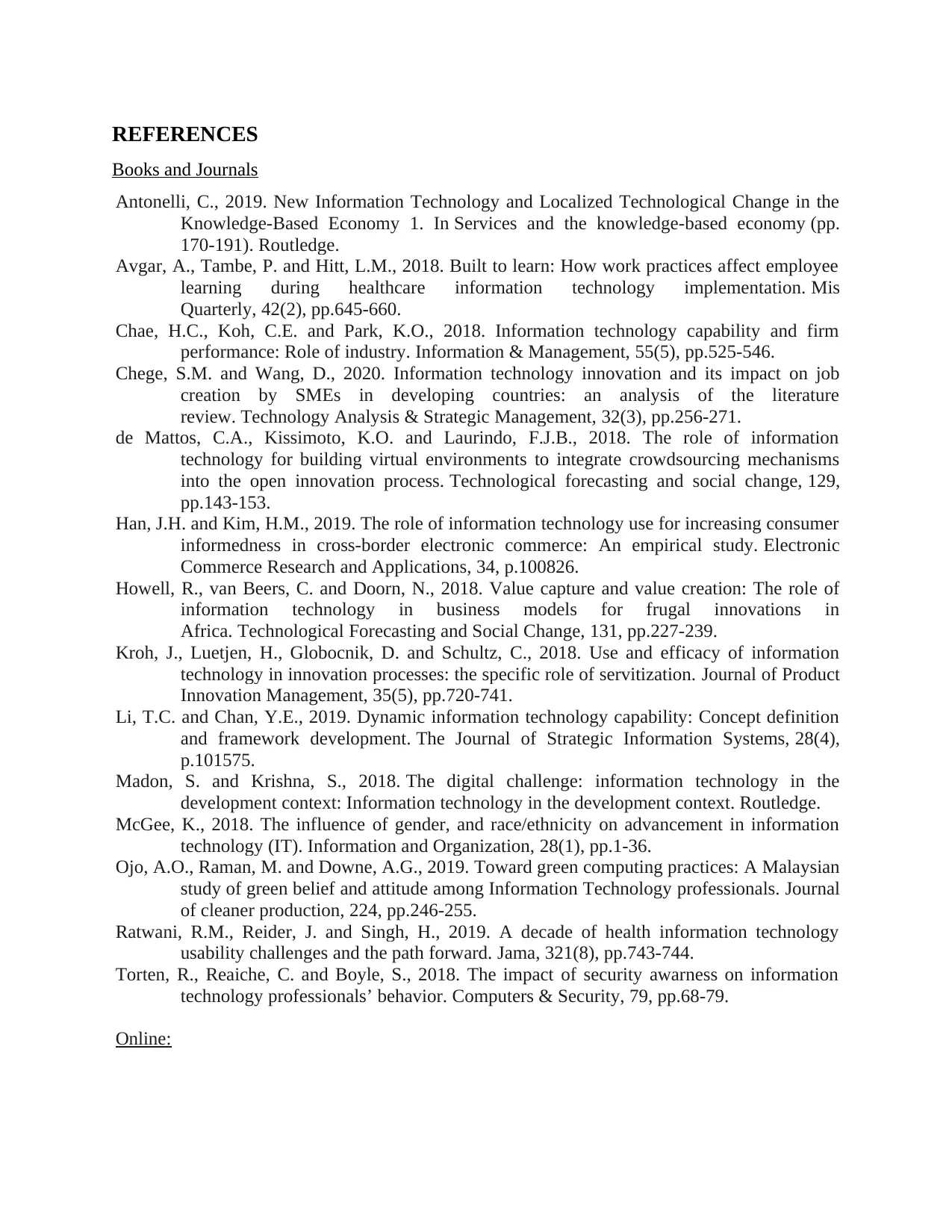
REFERENCES
Books and Journals
Antonelli, C., 2019. New Information Technology and Localized Technological Change in the
Knowledge-Based Economy 1. In Services and the knowledge-based economy (pp.
170-191). Routledge.
Avgar, A., Tambe, P. and Hitt, L.M., 2018. Built to learn: How work practices affect employee
learning during healthcare information technology implementation. Mis
Quarterly, 42(2), pp.645-660.
Chae, H.C., Koh, C.E. and Park, K.O., 2018. Information technology capability and firm
performance: Role of industry. Information & Management, 55(5), pp.525-546.
Chege, S.M. and Wang, D., 2020. Information technology innovation and its impact on job
creation by SMEs in developing countries: an analysis of the literature
review. Technology Analysis & Strategic Management, 32(3), pp.256-271.
de Mattos, C.A., Kissimoto, K.O. and Laurindo, F.J.B., 2018. The role of information
technology for building virtual environments to integrate crowdsourcing mechanisms
into the open innovation process. Technological forecasting and social change, 129,
pp.143-153.
Han, J.H. and Kim, H.M., 2019. The role of information technology use for increasing consumer
informedness in cross-border electronic commerce: An empirical study. Electronic
Commerce Research and Applications, 34, p.100826.
Howell, R., van Beers, C. and Doorn, N., 2018. Value capture and value creation: The role of
information technology in business models for frugal innovations in
Africa. Technological Forecasting and Social Change, 131, pp.227-239.
Kroh, J., Luetjen, H., Globocnik, D. and Schultz, C., 2018. Use and efficacy of information
technology in innovation processes: the specific role of servitization. Journal of Product
Innovation Management, 35(5), pp.720-741.
Li, T.C. and Chan, Y.E., 2019. Dynamic information technology capability: Concept definition
and framework development. The Journal of Strategic Information Systems, 28(4),
p.101575.
Madon, S. and Krishna, S., 2018. The digital challenge: information technology in the
development context: Information technology in the development context. Routledge.
McGee, K., 2018. The influence of gender, and race/ethnicity on advancement in information
technology (IT). Information and Organization, 28(1), pp.1-36.
Ojo, A.O., Raman, M. and Downe, A.G., 2019. Toward green computing practices: A Malaysian
study of green belief and attitude among Information Technology professionals. Journal
of cleaner production, 224, pp.246-255.
Ratwani, R.M., Reider, J. and Singh, H., 2019. A decade of health information technology
usability challenges and the path forward. Jama, 321(8), pp.743-744.
Torten, R., Reaiche, C. and Boyle, S., 2018. The impact of security awarness on information
technology professionals’ behavior. Computers & Security, 79, pp.68-79.
Online:
Books and Journals
Antonelli, C., 2019. New Information Technology and Localized Technological Change in the
Knowledge-Based Economy 1. In Services and the knowledge-based economy (pp.
170-191). Routledge.
Avgar, A., Tambe, P. and Hitt, L.M., 2018. Built to learn: How work practices affect employee
learning during healthcare information technology implementation. Mis
Quarterly, 42(2), pp.645-660.
Chae, H.C., Koh, C.E. and Park, K.O., 2018. Information technology capability and firm
performance: Role of industry. Information & Management, 55(5), pp.525-546.
Chege, S.M. and Wang, D., 2020. Information technology innovation and its impact on job
creation by SMEs in developing countries: an analysis of the literature
review. Technology Analysis & Strategic Management, 32(3), pp.256-271.
de Mattos, C.A., Kissimoto, K.O. and Laurindo, F.J.B., 2018. The role of information
technology for building virtual environments to integrate crowdsourcing mechanisms
into the open innovation process. Technological forecasting and social change, 129,
pp.143-153.
Han, J.H. and Kim, H.M., 2019. The role of information technology use for increasing consumer
informedness in cross-border electronic commerce: An empirical study. Electronic
Commerce Research and Applications, 34, p.100826.
Howell, R., van Beers, C. and Doorn, N., 2018. Value capture and value creation: The role of
information technology in business models for frugal innovations in
Africa. Technological Forecasting and Social Change, 131, pp.227-239.
Kroh, J., Luetjen, H., Globocnik, D. and Schultz, C., 2018. Use and efficacy of information
technology in innovation processes: the specific role of servitization. Journal of Product
Innovation Management, 35(5), pp.720-741.
Li, T.C. and Chan, Y.E., 2019. Dynamic information technology capability: Concept definition
and framework development. The Journal of Strategic Information Systems, 28(4),
p.101575.
Madon, S. and Krishna, S., 2018. The digital challenge: information technology in the
development context: Information technology in the development context. Routledge.
McGee, K., 2018. The influence of gender, and race/ethnicity on advancement in information
technology (IT). Information and Organization, 28(1), pp.1-36.
Ojo, A.O., Raman, M. and Downe, A.G., 2019. Toward green computing practices: A Malaysian
study of green belief and attitude among Information Technology professionals. Journal
of cleaner production, 224, pp.246-255.
Ratwani, R.M., Reider, J. and Singh, H., 2019. A decade of health information technology
usability challenges and the path forward. Jama, 321(8), pp.743-744.
Torten, R., Reaiche, C. and Boyle, S., 2018. The impact of security awarness on information
technology professionals’ behavior. Computers & Security, 79, pp.68-79.
Online:
⊘ This is a preview!⊘
Do you want full access?
Subscribe today to unlock all pages.

Trusted by 1+ million students worldwide
1 out of 13
Related Documents
Your All-in-One AI-Powered Toolkit for Academic Success.
+13062052269
info@desklib.com
Available 24*7 on WhatsApp / Email
![[object Object]](/_next/static/media/star-bottom.7253800d.svg)
Unlock your academic potential
Copyright © 2020–2026 A2Z Services. All Rights Reserved. Developed and managed by ZUCOL.


